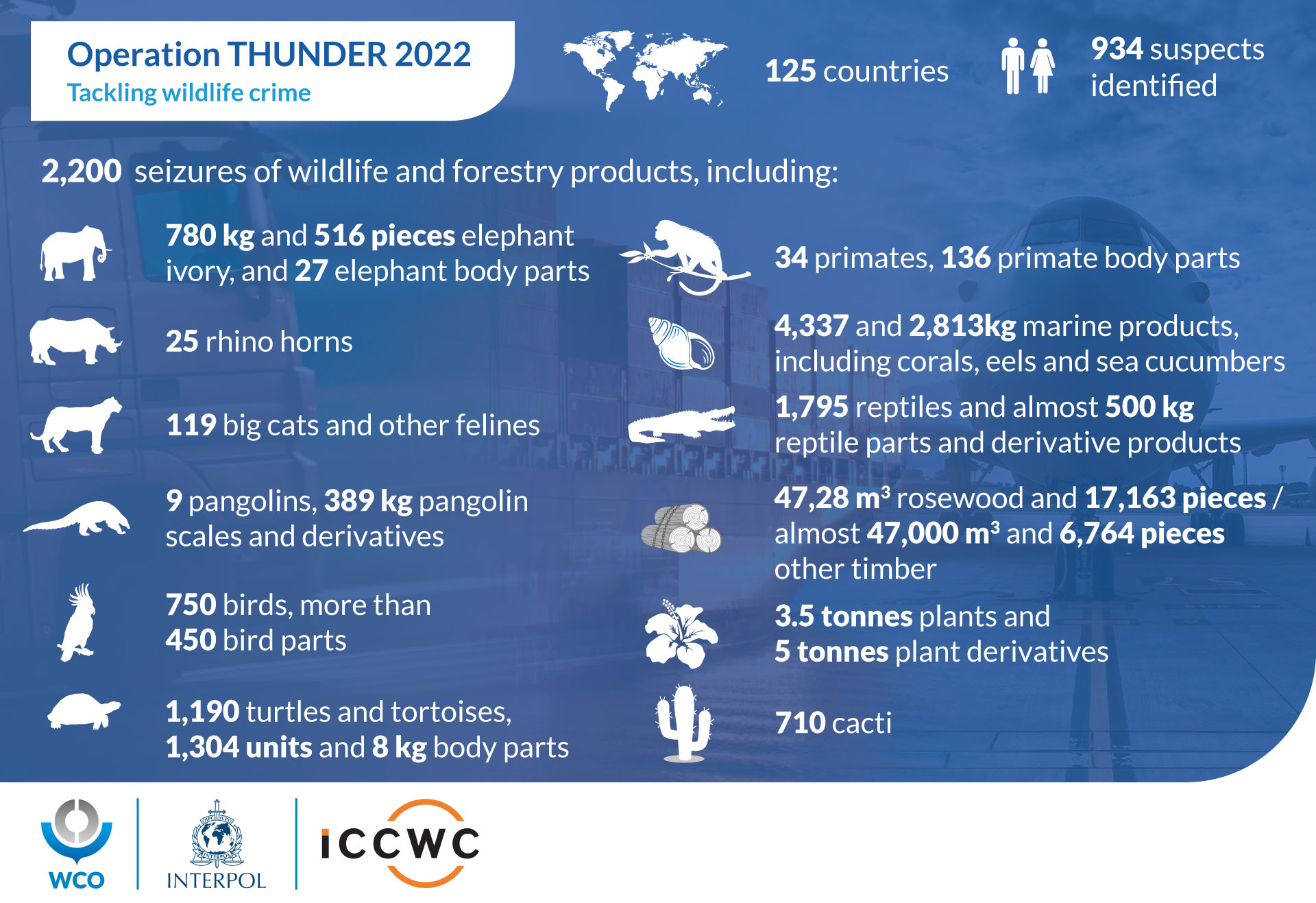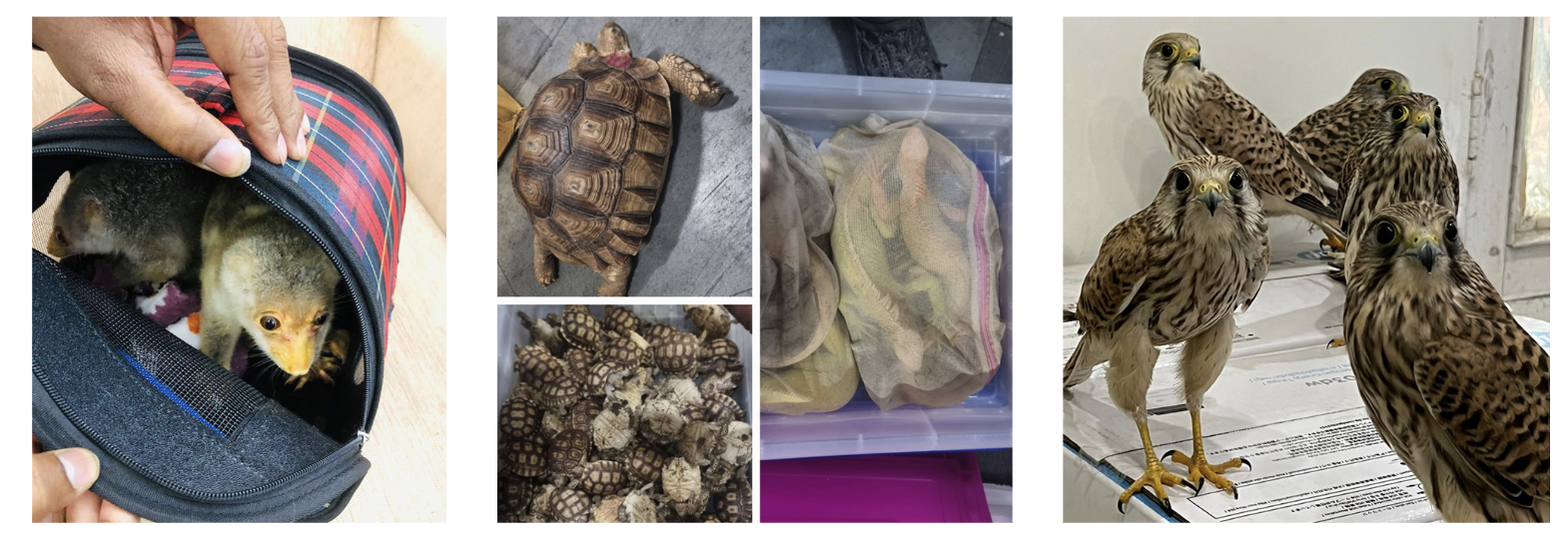Hundreds of arrests, thousands of seizures and the disruption of wildlife and timber crime networks have taken place globally in 125 countries.
Codenamed “Thunder 2022", the joint law enforcement operation coordinated by INTERPOL and the World Customs Organization (WCO) and with the backing of the Convention on International Trade in Endangered Species of Wild Fauna and Flora (CITES) and the International Consortium on Combating Wildlife Crime (ICCWC), brought together police, customs, financial intelligence units and national bodies responsible for combating wildlife crime.
Close to 800kg of elephant ivory, 119 big cats, and five tonnes of endangered plant species derivatives are just some of the 2,200 seizures of a broad range of CITES-listed species including rhino horns, pangolins, turtles and tortoises, reptiles, birds as well as timber and marine species reported during the operation.
The one-month long operation in October 2022 consisted of searches at land and air border checkpoints and focused on illegally traded species protected by national legislation or by CITES, an international agreement between governments which aims to ensure that international trade in specimens of wild animals and plants does not threaten the survival of the species.
Reported seizures from countries included 1,204 reptiles by Indian Customs at Chennai International Airport, such as iguanas, pythons, monitor lizards and tortoises declared as ‘ornamental fish' and packed in cardboard boxes sent from Malaysia. Customs in Thailand seized 81 Indian star tortoises, a species threatened with extinction and listed under CITES Appendix I, hidden in food packaging in the luggage of a passenger traveling from India. Other smuggling interceptions included young birds of prey seized by authorities in Pakistan, elephant tusks smuggled across borders intercepted by Mozambique authorities, and thirteen undeclared protected parrots which were hidden with declared birds and seized by Norwegian authorities. Parrots, iguana eggs, coral, crocodile leather products, caviar and shark meat were seized in several US international airports. Thunder 2022 also helped authorities identify 934 suspects.
Total worldwide seizures of protected animals and plants reported so far include:
Wildlife:
- 119 big cats and other felines
- 34 primates, 136 primate body parts
- 25 rhino horns
- 9 pangolins, 389 kg pangolin scales and derivatives
- 750 birds, more than 450 bird parts
With seizures reported in units, or total kg, according to national police practices, results also include:
- Almost 780 kg and 516 pieces elephant ivory, and 27 elephant body parts
- 1,795 reptiles and almost half a tonne reptile parts and derivative products
- 4,337 and 2,813 kg marine products, including corals, eels and sea cucumbers
- 1,190 turtles and tortoises, 1,304 units and 8 kg body parts
- More than a tonne and 17,081 units other wildlife, parts and derivatives.
Plants and timber:
- 47,28 m3 rosewood and 17,163 pieces
- Almost 47,000 m3 and 6,764 pieces other timber
- 710 cacti, 125 and 1,706 kg orchids
- Almost 3.5 tonnes and 7,815 units other plants
- More than five tonnes and 3,945 units plant derivatives.

Thunder Operations supported by ICCWC have been taking place on a yearly basis since 2017 and this is the largest number of countries ever to take part since the initiative was first launched. Through routine inspections and targeted controls, the operation involved the examination of hundreds of parcels, suitcases, vehicles, boats and cargo transporters. Customs and police units shared wildlife and timber trafficking intelligence both ahead of and during operations, enabling field officers to identify and target trafficking hotspots. Known criminals, including INTERPOL Red Notice fugitives, were identified ahead of operations, along with companies used to facilitate wildlife and timber crime.
Thunder Operations are funded by the European Commission’s Directorate General for International Partnerships, Norway’s International Climate and Forest Initiative, the UK’s Department for Environment, Food and Rural Affairs, and the US Agency for International Development.
For more information, see press releases on Thunder 2022 from INTERPOL and the World Customs Organization.

__________________________________
About Operation Thunder 2022
Thunder Operations are an annual global crackdown that take place across borders to combat wildlife and forest crime. These Operations have resulted in significant seizures and the arrest of thousands of suspects engaged in the illegal trade of wildlife and timber species. The Operations are coordinated jointly by the WCO and INTERPOL, with the backing of the CITES Secretariat and the International Consortium on Combating Wildlife Crime. The Operations are funded by the European Commission’s Directorate General for International Partnerships, Norway’s International Climate and Forest Initiative, the UK’s Department for Environment, Food and Rural Affairs, and the US Agency for International Development.
See INTERPOL press release.
See WCO press release.
About ICCWC
The International Consortium on Combating Wildlife Crime (ICCWC) is a unique partnership of five intergovernmental organizations to help law enforcement bring criminals engaged in wildlife crime to justice. Through technical assistance, tools, training, and operational support, ICCWC works along the entire criminal justice chain, building the capacity of frontline law enforcement in countries and regions around the world affected by wildlife crime. The ICCWC partners are the Secretariat of the Convention on International Trade in Endangered Species of Wild Fauna and Flora (CITES), the International Criminal Police Organization (INTERPOL), the United Nations Office on Drugs and Crime (UNODC), the World Bank Group (WBG) and the World Customs Organization (WCO).
Connect with ICCWC:
About CITES
With 184 Parties, the Convention on International Trade in Endangered Species of Wild Fauna and Flora (CITES) remains one of the world's most powerful tools for wildlife conservation through the regulation of trade. Thousands of species are internationally traded and used by people in their daily lives for food, health care, housing, tourist souvenirs, cosmetics or fashion. CITES regulates international trade in over 38,700 species of plants and animals, including their products and derivatives, to ensure their survival in the wild with benefits for the livelihoods of local people and the global environment. The CITES permit system seeks to ensure that international trade in listed species is sustainable, legal and traceable. CITES was signed in Washington D.C. on 3 March 1973 and entered into force on 1 July 1975.
More news
Implementation support
Implementation Support Support is provided based on a targeted approach, needs identified and requests received, and is aimed at strengthening criminal justice systems and providing coordinated support to further enhance countries' responses to combat wildlife crime. A diverse range of activities have been conducted and initiatives supported by the Consortium...



